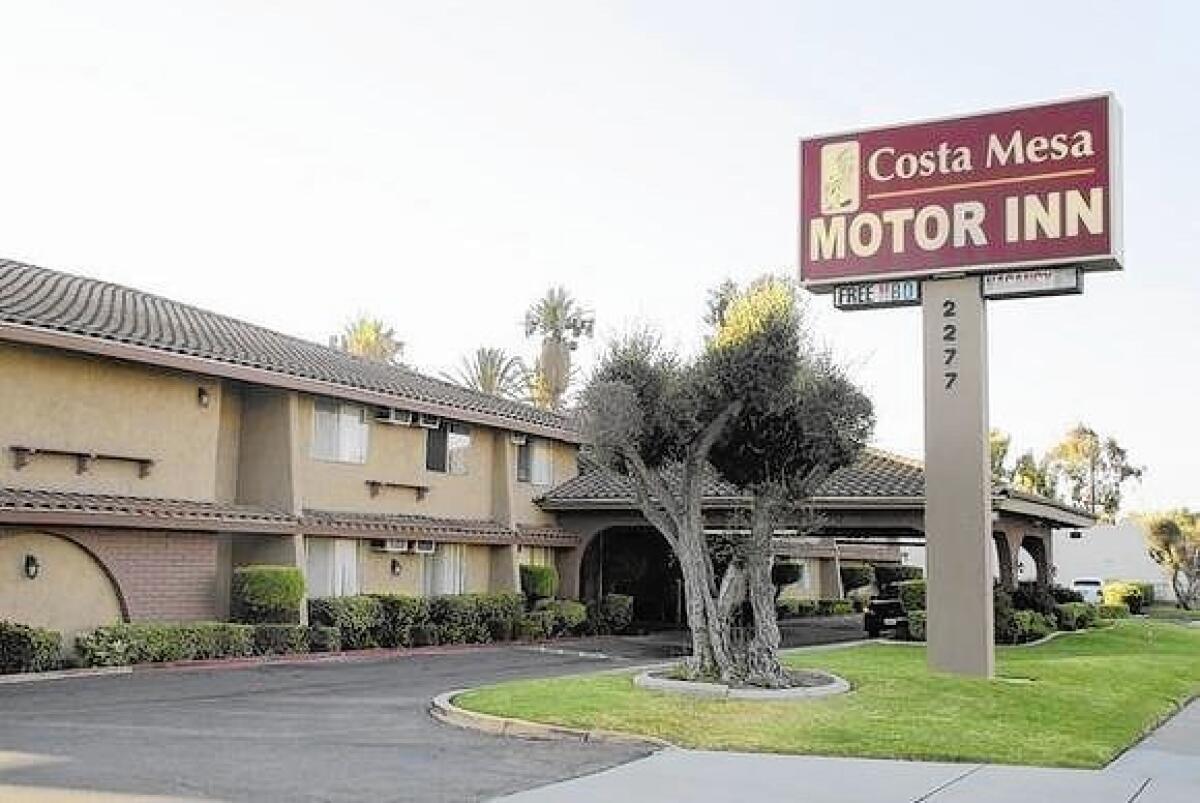Costa Mesa OKs luxury apartments to replace blighted Motor Inn

The Costa Mesa City Council has approved a redevelopment plan for the Costa Mesa Motor Inn property. The motel will be demolished and replaced with 224 luxury apartments.
After more than four hours of testimony and occasional testy interaction, the Costa Mesa City Council approved a plan late Tuesday for hundreds of luxury apartments to replace the Costa Mesa Motor Inn.
Supporters said the 224 high-end units are a welcome replacement for the blighted motel at 2277 Harbor Blvd., long infamous for criminal activity and documented health and safety violations.
The project is less about housing, said Mayor Pro Tem Jim Righeimer, and more “about getting rid of a cancer in the middle of the city.”
Added Don Lamm, a former Costa Mesa deputy city manager representing the 236-room motel’s owner, Los Angeles-based Miracle Mile Properties: “We feel this will be an excellent addition to the city … [Miracle Mile wants] to get out of operating a motel and all of the issues and problems it presents.”
Detractors pointed to another reality at the Motor Inn: the dozens of tenants, including families, who live there and will be displaced by the change. They also were critical that Miracle Mile did not include any low-income housing in its proposal.
Representatives from the Public Law Center in Santa Ana and Kennedy Commission protested the plans, saying the city is violating and circumventing California laws that give bonuses to developers in exchange for low- and very low-income units.
“Costa Mesa would be foolish,” said Kathy Esfahani, a leader with the Costa Mesa Affordable Housing Coalition. “We would be like a chump to simply give increased density without asking for affordable housing in return.”
Esfahani was one of nearly 40 people who spoke about the project. A majority were either against the plan or lamented the lack of affordable housing citywide.
At the onset of Tuesday’s meeting, the coalition — which has hosted two recent demonstrations against the project — staged a candlelight vigil to represent the Motor Inn children losing their homes because of the redevelopment plan.
The participants held up artwork that the motel children drew this weekend. They sang “We Shall Overcome” and other songs.
The coalition urged Miracle Mile to allocate 20% of the 224 units for low-income households.
Lamm said adding low-income units to the estimated $50-million apartment complex was not financially feasible, partially because Miracle Mile is not receiving any government funds to subsidize them.
Righeimer, whose professional background is in development, estimated that Miracle Mile would lose $10 million if it provided affordable housing without any outside public funding.
“It’s just not magic,” he said.
Righeimer then suggested that if Costa Mesa wants to fund affordable-housing projects, the November 2016 ballot should contain a $20-million bond toward that goal.
About 50 of the Motor Inn’s rooms have long-term tenants. Miracle Mile proposes to close the motel by Aug. 1.
Those residents will be eligible for relocation assistance packages worth up to $5,500. The company, at the urging of Councilwoman Katrina Foley, also pledged to give another $200,000 directly to the city, which will use it to fund relocation efforts.
Foley said she was thinking about the 45 children who live at the Motor Inn.
“They simply must be where they can have shelter and some stability, even if it’s not the kind of stability which I would want for my kids,” she said. “That’s the lens of which I look through this.”
Mick Meldrum, an owner and manager of the Harbor Center across from the Motor Inn, said the center’s tenants and shoppers have long been “victims” of the motel, which he called a “crime magnet and breeding ground for the problems.”
“How do we know?” Meldrum said. “We’re their neighbors.”
Another Harbor Center owner, Scott Bell, spoke in favor of the apartments. After he left the podium, Foley said she wanted to ask him questions, but Mayor Steve Mensinger told her she could not because it wasn’t her turn to speak and that she could after the public-comment period.
Foley continued talking until Mensinger slammed his gavel and called the meeting to a recess.
“You can immaturely stop or you can continue the meeting,” Foley said to Mensinger. “You’re delaying it, not me.”
Following the break, Mensinger said to Foley, an attorney, “We’re not going to be cross-examining speakers.”
Foley replied that it wasn’t an act of cross-examination to ask follow-up questions of the public.
Councilwoman Sandy Genis cast the lone dissenting vote on the Motor Inn approval.
She questioned the project’s environmental impact report, particularly its traffic projections. Genis also wanted a more precise definition of what Miracle Mile meant by the 20 “moderate” income units it has set aside in the complex that will be below market rates.
“It doesn’t look like it’s defined at all,” she said. “I would appreciate it if we could flesh that out.”
Genis also disagreed with descriptions of living conditions at the Motor Inn.
“It’s not a great place to live,” she said, “but I think it may have been unfairly portrayed.”
